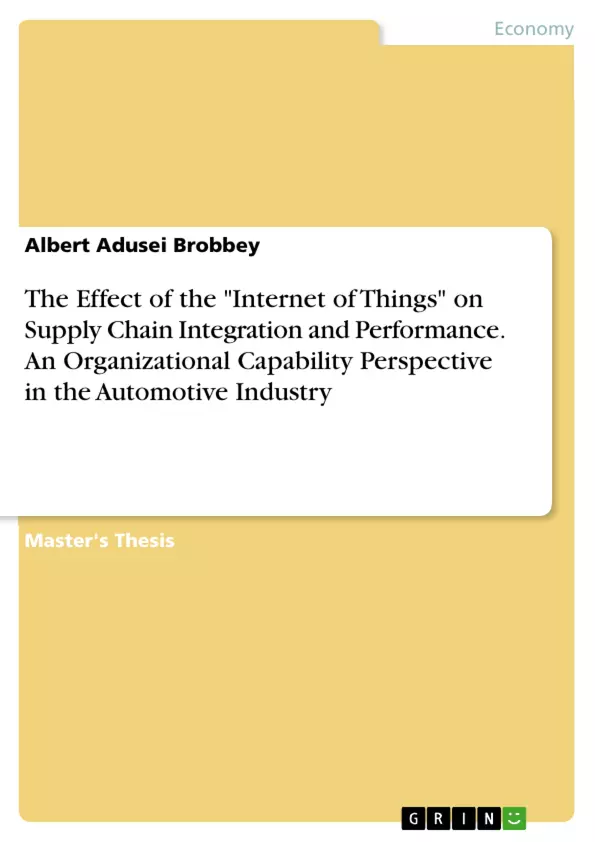This study explores the effect of Internet of Things (IoT) on supply chain integration and performance in the automotive industry of Germany. The dataset comprises a quantitative survey and a sample size of 50 employees in the automotive industry of Germany. The IoT is a next generation of Internet connected embedded ICT systems in a digital environment to seamlessly integrate supply chain and logistics processes. Integrating emerging IoT into the current ICT systems can be unique because of its intelligence, autonomous and pervasive applications for better organizational performance.
The obtained data from a structured questionnaire, which was built on a 5-point Likert scale, was analyzed by the use of Linear Regression. The analysis of the study was enacted by using STATA (15.0) statistical software to excerpt the results. The proposed model was blueprinted based on relationship marketing theory, resource-based view theory, contingency theory, and related literature. Before estimating the main results, preliminary analysis such as descriptive statistics, correlation analysis, validity and reliability of the instruments, multi-collinearity test and model fitness were done to provide initial justification and appropriateness of the instruments and the methods chosen to test the proposed relationships guiding the study.
Inhaltsverzeichnis (Table of Contents)
- CHAPTER ONE
- INTRODUCTION
- 1.1 Background of the Study
- 1.2 Problem Statement
- 1.3 Research Objectives
- 1.4 Research Questions
- 1.5 Significance of the Study
- 1.6 Brief Methodology
- 1.7 Structure of the Study
- CHAPTER TWO
- LITERATURE REVIEW
- 2.0 Introduction
- 2.1 The Internet of Things (IoT)
- 2.2 Supply Chain Integration (SCI)
- 2.3 Performance
- 2.4 The relationship between Internet of Thing and supply chain integration
- 2.5 The relationship between Internet of Thing and performance
- 2.6 The relationship between supply chain integration and performance
- 2.7 Related Theories
- 2.7.1 Organizational Capability Theory
- 2.7.2 Systems Theory
- CHAPTER THREE
- RESEARCH METHODOLOGY
- 3.0 Introduction
- 3.1 Research Design
- 3.2 Research paradigm
- 3.3 Population of the study
- 3.4 Sampling Size and Technique
- 3.5 Questionnaire Design and Data Collection Instrument
- 3.6 Data Sources and Collection Procedure
- 3.7 Data analysis
- 3.8 Ethical considerations
- DATA ANALYSES AND DISCUSSION OF FINDINGS
- 4.0 Introduction
- 4.1 Evaluation of Common Method Variance (CMV)
- 4.2 Descriptive Statistics
- 4.3 Reliability and Validity of the Constructs
- 4.3.1 Standardized Factor Loadings and T Values
- 4.3.2 Correlation Matrix and Average Variance Extracted (AVE)
- 4.3.3 Model Fitness
- 4.3.4 Kaiser-Meyer-Olkin (KMO) Barlet's Test (BT)
- 4.3.5 Rotated Component Matrix
- 4.4 Multi-collinearity Test
- 4.5 Analysis of the Effect of Internet of Thing on Supply chain performance
- 4.6 Analysis of the Effect of Internet of Thing on Performance
- 4.7 Analysis of the Effect of Supply Chain Integration on Performance
- 4.8 Discussions of Findings
- 4.9 summary of research hypothesis
- CHAPTER FIVE
- CONCLUSIONS AND RECOMMENDATIONS
- 5.1 Conclusions of the study
- 5.2 Theoretical and managerial implications
- 5.3 Recommendation of the study
- 5.4 Limitations and recommendation for future research
Zielsetzung und Themenschwerpunkte (Objectives and Key Themes)
This study examines the impact of the Internet of Things (IoT) on supply chain integration and performance within the German automotive industry. The primary aim is to investigate the relationship between IoT, supply chain integration, and overall organizational performance. Specifically, the research explores whether and how IoT influences supply chain integration, and subsequently, the operational efficiency and effectiveness of automotive companies.
- Impact of IoT on Supply Chain Integration
- Influence of IoT on Organizational Performance
- Relationship between Supply Chain Integration and Performance
- Application of Organizational Capability Theory and Systems Theory
- Empirical Analysis using Linear Regression and STATA software
Zusammenfassung der Kapitel (Chapter Summaries)
Chapter One provides an introduction to the research, outlining the background, problem statement, research objectives, and significance of the study. It also details the methodology used and the structure of the paper. Chapter Two presents a comprehensive literature review, exploring the concepts of IoT, supply chain integration, performance, and their interrelationships. It also introduces relevant theories such as organizational capability theory and systems theory to provide a theoretical framework for the study. Chapter Three describes the research methodology employed, including the research design, paradigm, population, sampling technique, data collection methods, data analysis, and ethical considerations. This chapter focuses on the practical implementation of the research, providing detailed information about the data gathering and analysis processes.
Schlüsselwörter (Keywords)
This research study focuses on the impact of the Internet of Things (IoT) on supply chain integration and performance in the automotive industry. The key concepts explored include IoT, supply chain integration, organizational capability theory, systems theory, and empirical analysis using linear regression. The study examines how IoT can contribute to enhanced supply chain integration and ultimately lead to improved organizational performance within the context of the automotive industry.
Frequently Asked Questions
How does the Internet of Things (IoT) affect the automotive supply chain?
IoT enables seamless integration of logistics processes through intelligent, autonomous ICT systems, leading to better organizational performance and real-time tracking.
What is the relationship between IoT and supply chain integration?
IoT acts as a catalyst for integration by connecting various stages of the supply chain digitally, allowing for faster data exchange and coordinated decision-making.
Which theories explain IoT's impact on business performance?
The study utilizes Organizational Capability Theory, Systems Theory, and Resource-Based View Theory to explain how IoT creates unique competitive advantages.
What are the benefits of IoT in the German automotive industry?
Benefits include increased operational efficiency, enhanced supply chain visibility, reduced lead times, and overall improved organizational effectiveness.
How was the data for this IoT study analyzed?
The research used quantitative surveys from 50 industry employees and analyzed the results using Linear Regression with STATA statistical software.
- Quote paper
- Albert Adusei Brobbey (Author), 2022, The Effect of the "Internet of Things" on Supply Chain Integration and Performance. An Organizational Capability Perspective in the Automotive Industry, Munich, GRIN Verlag, https://www.grin.com/document/1281134



